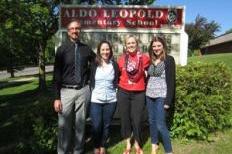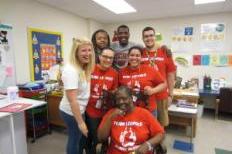






This story is part of the Bridging a Gap, a Madison Commons special report on Madison’s racial academic achievement gap. To view the full report, visit achievement.madisoncommons.org.
To tackle a problem as complex as the achievement gap, you need people who thrive on a challenge, feel passionate about doing right by their students and want to make a difference in the lives of children in poverty. A school’s primary mission is instruction, but to get children ready to learn academic skills, they also need to learn how to cope with the emotional rollercoaster that often results from living in poverty.
 Leopold Elementary School’s administrative and instructional leadership team includes (left to right) Mathew Thompso, Jaclyn Smith, Karine Sloan and Kendra Cerniglia. (Leopold Elementary School)
Leopold Elementary School’s administrative and instructional leadership team includes (left to right) Mathew Thompso, Jaclyn Smith, Karine Sloan and Kendra Cerniglia. (Leopold Elementary School)
“We strongly believe that we have to treat academic and social-emotional learning together, because instruction and positive behavior are so closely linked,” Principal Karine Sloan says. “You simply cannot have one without the other.”
Sloan has put that belief into practice since she became principal at Leopold Elementary School in July 2014. Whether or not it will help narrow Leopold’s academic achievement gap may be a test case for the entire school district.
With more than 700 students, Leopold is the district’s largest elementary school and one of its most diverse: 23 percent of the students are white, 35 percent black and 38 percent Hispanic. Students population experiences significant mobility and homelessness issues, with up to 100 students exiting the attendance area and half that number becoming homeless during a typical school year.
Leopold has the district’s sixth-highest poverty rate, with 74 percent of students eligible for free or reduced lunch and breakfast. Most of these students live in the Section 8 subsidized housing neighborhood that surrounds the school. When they walk to school in the morning for their first meal of the day, they may or may not be ready to learn.
Dealing with family poverty at home may consume much of a child’s mental energy and sometimes shows up as disruptive behavior at school—and that has long been the number one challenge for Leopold’s teachers and staff. The traditional response to misbehaving children has been to send them out into the hallway or the principal’s office, but that means losing valuable instructional time.
 Mathew Thompson, Leopold’s assistant principal, uses data to find out why teaching time is lost due to behavior problems. (Abigail Becker/Madison Commons)“To me, the gap-closing leadership move was to understand why we lose a lot of teaching time from kids not being in the classroom,” Mathew Thompson, Leopold’s Assistant Principal says. “In the 2012-13 school year, we had over 2,200 office referrals. More than 80 percent of them were due to uncooperative and disruptive behavior in the classroom.”
Mathew Thompson, Leopold’s assistant principal, uses data to find out why teaching time is lost due to behavior problems. (Abigail Becker/Madison Commons)“To me, the gap-closing leadership move was to understand why we lose a lot of teaching time from kids not being in the classroom,” Mathew Thompson, Leopold’s Assistant Principal says. “In the 2012-13 school year, we had over 2,200 office referrals. More than 80 percent of them were due to uncooperative and disruptive behavior in the classroom.”
When you do the math, that is an average of over 12 calls per school day, or one every thirty minutes.
After fielding the lion’s share of those calls for one year, Thompson was convinced that Leopold’s leadership team needed to make a big change—in order to help students learn and teachers instruct.
“We wanted to show the teachers that we understand their concerns and are responding with a significant change in the system,” Thompson says. “It’s not just a tweak, it’s not just adding another person. It’s making a commitment to teach the behavior we desire to see so that students stay in the classroom and are able to learn.”
For Sloan and Thompson, that commitment was setting up a data-driven multi-tiered system of support (MTSS) that includes positive behavioral support (PBS), the definition of very clear expectations in each and every part of the school building, explicit instruction of how students can meet these expectations, and rewards for doing so.
Getting a Tito paw for opening the door for a fellow student may seem like a small thing, but Thompson believes that teaching appropriate behavior at a young age is key for later success in life. “As educators, we sometimes forget that the little things we do now are building on each other over time,” he notes.
A cornerstone of Leopold’s PBS system is “the Ranch,” a dedicated space where social-emotional learning takes place. Here, students who have recurrent behavioral issues work in different color-coded zones on anger management, self-regulation and coping skills.
These students visit the Ranch for 30 minutes every school day during the WIN (What I Need) block that is set aside by each grade level. Kids who struggle academically receive math or literacy interventions during WIN time; enrichment activities are provided to those students who do not need specific interventions.
“Orchestrating six different WIN blocks a day with 700 kids having to be taken to where they need to be and picked up again 30 minutes later is definitely a challenge,” Sloan admits. “I’d be lying if managing this system didn’t feel overwhelming at times.”
The key to managing it are sufficient resources: Sloan’s staff includes five behavioral specialists with PBS and mental health training who receive regular professional development through the district. She has an additional six positions who run social-emotional learning groups during WIN time.
 Leopold Elementary School’s behavior support team includes Linda Johnson (seated); second row from left: Stephanie Nagel, Lori Gianpaolo, Dulce Contreras; third row from left: Jeremy Thornton, Vincent Carey and Thomas Casper. (Leopold Elementary)All of these staff members buy into the importance of entering each and every one of the daily office calls into the school’s MTSS database.
Leopold Elementary School’s behavior support team includes Linda Johnson (seated); second row from left: Stephanie Nagel, Lori Gianpaolo, Dulce Contreras; third row from left: Jeremy Thornton, Vincent Carey and Thomas Casper. (Leopold Elementary)All of these staff members buy into the importance of entering each and every one of the daily office calls into the school’s MTSS database.
“Having a data-driven system allows us to see where trends are happening,” Thompson explains. “We can identify trends by time of day, by day of the week, and by location in the building. If there’s a hotspot in a certain part of the school, we can develop a teaching plan to address that with the kids.”
In addition to a dedicated PBS team, Sloan and Thompson also created new staff positions that provide instructional support to teachers and help them address the wide range of academic abilities they see in their classrooms.
Leopold’s full-time instructional coaches not only allow teachers to better coordinate the curriculum across grade-level classrooms but also emphasizes the importance of building relationships with students in order to provide much-needed emotional support.
“The students have to see that you respect them, that you care for them and are excited that they are here every day,” Sloan says. “That is the message you have to communicate, both to the kids and to their families.”
If the emotional support is there, the academic assessment reflects it: in standardized tests, students who have developed strong relationships with their teacher, and trust that he or she believes in them, outperform those who do not experience that level of support, according to instructional coach Kendra Cerniglia.
 Karine Sloan has served as principal of Leopold Elementary School since July 2014. She says schools need to address academic, social and emotional learning together. (Lew Friedland/Madison Commons)
Karine Sloan has served as principal of Leopold Elementary School since July 2014. She says schools need to address academic, social and emotional learning together. (Lew Friedland/Madison Commons)
Next, the Leopold leadership team plans to increase the school’s community involvement and help teachers fine-tune their cultural competency skills, which include recognizing and reducing implicit bias. Their goal is to make all members of the school staff understand that the achievement gap is not about natural ability.
“It’s about giving all of our kids the resources they need to succeed at school,” Sloan says. “We have to get teachers to talk about their belief systems, some of which may not be based on the evidence they have in their classrooms. Those are among the hardest and most important conversations we need to have.”
While Leopold’s leadership team has their work cut out for them, Thompson is optimistic about the future.
“All turn-around schools have a strong community component,” he says. “If we can increase that for Leopold, I feel that we are poised for some really big jumps next year.”
|
|
|
Welcome to the Madison Commons, a website designed to provide news and information about all of Madison's neighborhoods and a crossroads for the discussion of community issues. The name comes from the idea of a village commons, a place for news, talk, debate, and some entertainment, too, that's open to everyone.
All rights reserved. Read more about the Madison Commons and its partners.

